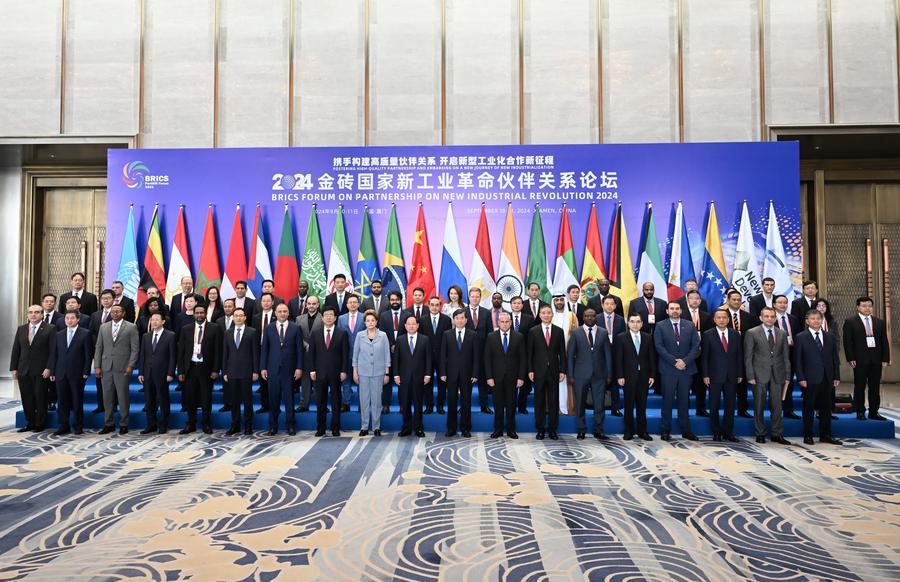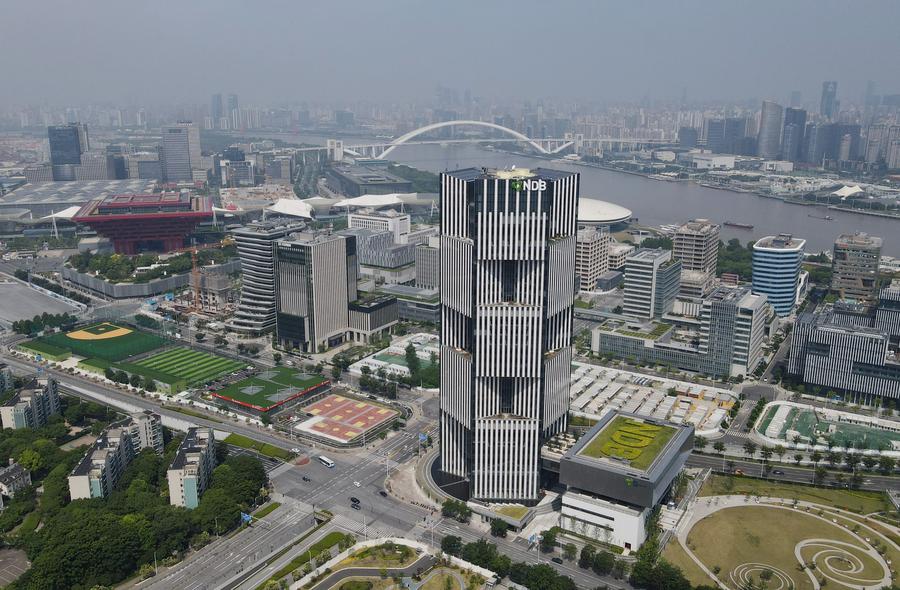Interview: Expanded BRICS cooperation to further contribute to global governance, says Chinese envoy

Participants of BRICS Forum on Partnership on New Industrial Revolution 2024 pose for a group photo in Xiamen, southeast China's Fujian Province, Sept. 10, 2024. (Xinhua/Lin Shanchuan)
BRICS members will continue to pursue modernization together, contribute more to global governance system, and offer "BRICS solutions" to the major transformations happening worldwide.
MOSCOW, Oct. 21 (Xinhua) -- The expanded BRICS cooperation will make more contributions to improving the global governance system, said Chinese Ambassador to Russia Zhang Hanhui.
In an exclusive interview with Xinhua ahead of the 16th BRICS Summit scheduled from Oct. 22 to 24 in Russia's Kazan, Zhang noted that the summit is the first BRICS leaders' off-line summit since the group's expansion.
As the BRICS mechanism enters a new era of greater cooperation, BRICS members will continue to pursue modernization together, contribute more to improving the global governance system, and offer "BRICS solutions" to the major transformations happening worldwide, Zhang said.
Noting that BRICS countries represent the collective rise of emerging markets and developing nations, Zhang said BRICS has now become stronger, more influential, and full of potential with its recent expansion.
"China will continue to work closely with other BRICS members to forge a more comprehensive, closer, practical, and inclusive high-quality partnership, and together embark on a new journey for BRICS," he said.

Aerial photo taken on June 17, 2022 shows the headquarters building of the New Development Bank (NDB), also known as the BRICS bank, in east China's Shanghai. (Xinhua/Fang Zhe)
Noting that China and Russia, both permanent members of the United Nations Security Council and major emerging markets, Zhang said the two countries have always stood shoulder to shoulder, working closely to firmly defend the UN-centered international system, the outcomes of World War II, as well as international fairness and justice.
As independent forces in the process of building a multipolar world, China and Russia are pioneers in practicing the concept of building a community with a shared future for mankind, and advocates of democratizing international relations, Zhang said.
The two countries maintain close communication and coordination within multilateral mechanisms, leading reforms in the global governance system and promoting an equal and orderly world multipolarity and inclusive and balanced economic globalization, he added.
Noting that China has assumed the presidency of the Shanghai Cooperation Organization (SCO) while Russia holds the presidency of BRICS, the ambassador said that both sides are supporting each other in their respective chairmanship, further strengthening cooperation within a robust SCO and BRICS framework.
"China and Russia have driven the historic expansion of the SCO and BRICS mechanisms, leading the trend of independent, win-win cooperation, strengthening the unity of developing countries and the Global South, and contributing to improving the global governance system," Zhang said.

A visitor (C) takes photos of dough modelling art works during the Jilin Culture and Tourism Week in Vladivostok, Russia, Oct. 25, 2023. (Photo by Guo Feizhou/Xinhua)
During the summit, Chinese President Xi Jinping and his Russian counterpart are expected to hold in-depth discussions on bilateral relations, cooperation in various fields, and major international and regional issues, promoting the stable and long-term development of bilateral relations in the new era, he said.
Head-of-state diplomacy is the compass and stabilizer of China-Russia relations, playing a crucial and decisive role in guiding the direction of bilateral ties, said the ambassador.
This year marks the 75th anniversary of the establishment of diplomatic relations between China and Russia. Zhang noted that for three-quarters of a century, China-Russia relations have withstood the test of time and international changes, advancing steadily on the path of mutual respect, equality, peaceful coexistence, and win-win cooperation.
"This not only serves the fundamental interests of both countries and their peoples but also aligns with the broader expectations of the international community," he said.


